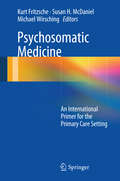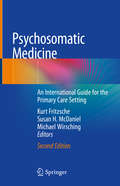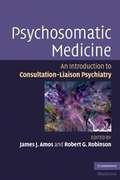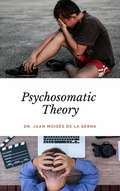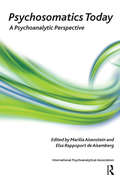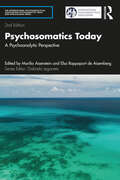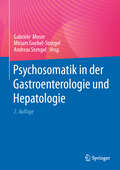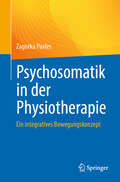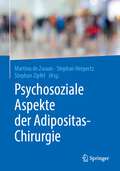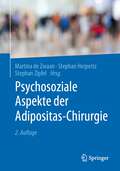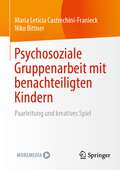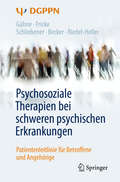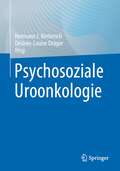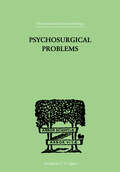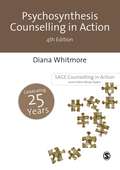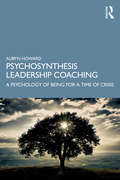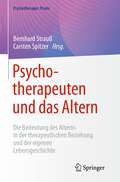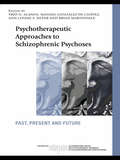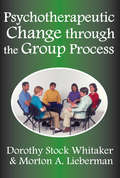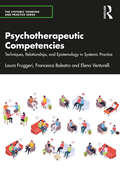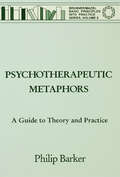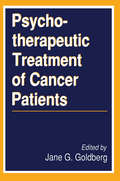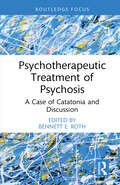- Table View
- List View
Psychosomatic Medicine
by Susan H. Mcdaniel Kurt Fritzsche Michael WirschingPsychosocial problems appear within a medical context worldwide, and are a major burden to health. Psychosomatic Medicine: An International Primer for the Primary Care Setting takes a uniquely global approach in laying the foundations of bio psychosocial basic care (such as recognizing psychosocial and psychosomatic problems, basic counseling and collaboration with mental health specialists) and provides relevant information about the most common mental and psychosomatic problems and disorders. The scope of the book is intercultural--it addresses global cultures, subcultures living in a single country and strengthening the care given by physicians working abroad. This clinically useful book outlines best practices for diagnosing the most common bio psychosocial problems and mastering the most common communication challenges (e. g. doctor-patient conversation, breaking bad news, dealing with difficult patients, family and health systems communication and collaboration). Every chapter integrates basic theoretical background and practical skills and includes trans-culturally sensitive material, important for work with patients from different cultures. Psychosomatic Medicine: An International Primer for the Primary Care Setting serves as an excellent resource for clinicians hoping to gain and develop knowledge and skills in psychosomatic medicine.
Psychosomatic Medicine: An International Guide for the Primary Care Setting
by Kurt Fritzsche Michael Wirsching Susan H. McDanielNow in its fully revised and expanded second edition, this volume is the definitive global resource on psychosocial problems. Containing several new chapters and featuring extensively updated contributions from experts in the field, this title takes a uniquely global approach in laying the foundations of bio psychosocial basic care and provides relevant information about the most common mental and psychosomatic problems and disorders. An extension of the cultural aspects of the individual clinical pictures and new contributions from China, Latin America, Russia, Iran, India, Africa and Myanmar, also about migration and mental health accompany this revision.This book is divided into four sections and begins by explaining the relationship between psychosomatic medicine and primary care. The next part outlines the best practices for diagnosing the most common biopsychosocial problems and mastering the most frequent communication challenges (e.g. biopsychosocial anamnesis, breaking bad news, dealing with difficult patients, family and health systems communication and collaboration). The following section delves into more specific psychosomatic problems such as depressive disorders, posttraumatic stress disorder, addiction, the terminally ill patient and eating disorders, among others. The final section focuses on developing psychosomatic medicine in international settings. Every chapter integrates basic theoretical background and practical skills and includes trans-culturally sensitive material, important for work with patients from different nations. Psychosomatic Medicine: An International Primer for the Primary Care Setting, second edition is a must-have reference for doctors from various specialties as well as nursing staff, social workers and clinical health psychologists.
Psychosomatic Medicine: An Introduction to Consultation-Liaison Psychiatry
by James J. Amos Robert G. RobinsonPsychosomatic medicine or consultation-liaison psychiatry is the branch of psychiatry that focuses on the mental health issues which accompany, or develop as a result of, other medical disorders. This subdiscipline forms an important part of training in psychiatry. This book provides an ideal first exposure to the inseparable nature of physical and psychological health and illness, and a comprehensive introduction to the broad range of disorders seen on the psychiatric consult service. Organized into a series of bitesized chapters, each focusing on a typical consult question, this handbook provides a practical and portable reference which should set both strategy and tactics for the next generation of consulting psychiatrists. Essential reading for medical students, psychiatry residents and psychosomatic fellows, this manual will provide immediate, in-the-field guidance on the evaluation and management of common consultation requests. <P><P><i>Advisory: This book offers only partial accessibility. We have kept it in the collection because it is useful for some of our members. Benetech is actively working on projects to improve accessibility issues such as these in the future.</i>
Psychosomatic Theory
by Juan Moises de la SernaPreface Emotions are a source of life and pleasure, but when they acquire certain negative nuances and become chronic, they can contribute to the appearance of psychosomatic disorders. These disorders are more frequent than one might imagine, especially because there is a great lack of understanding in the individual's overall health, how to preserve it and how to take care of it. This text is presented as a first approach to the subject of psychosomatic disorders from a theoretical perspective. Objective: The aim of this book is to serve as a first approach to psychosomatic medicine, focusing on the explanatory theories of its origin and its "function". A text to bring the reader closer to one of the most important challenges that medicine has taken on halfway through psychology, the psychosomatic disorders. Target audience: - Health practitioners who want to delve deeper into the effects of emotions on health - People suffering from psychosomatic disorders and to their families, so that they can learn in depth about this new perspective of the disorder - Anyone interested in learning how emotions can affect health and how to approach treatment from a holistic point of view Topic - Psychosomatic Approach and Psychosomatic Disorders This section covers the origin of the explanatory theories on the psychosomatic approach, and what type of disorders are included from this perspective. - The Psychosomatic Personality In this section is analyzed the origin of personality, its formation over time and the health problems of an "inadequate" personality. - Approach to Psychoneuroendocrinoimmunology (PNEI) Considered as the last great contribution of health science, this approach poses a model for overcoming the limitations of medicine and psychology, which only provide a limited view of psychosomatic disorders.
Psychosomatics Today: A Psychoanalytic Perspective (The International Psychoanalytical Association Psychoanalytic Ideas and Applications Series)
by Marilia Aisenstein Elsa Rappoport de AisembergPsychosomatics have classically been of peripheral importance within our wellknown theoretical models, despite the fact that they do have a history in the field of psychoanalysis. This might be owing to the fact that Freud did not explicitly approach psychosomatics and, in consequence, did not put forward any hypotheses within his theoretical body. However, the Freudian concepts of actual neuroses and mixed neuroses are a basis in order to understand psychosomatic phenomena. The same could be said about the connections established with subsequent Freudian theoretical models, such as: the introduction of narcissism, unresolved mourning processes, early trauma and the action of Thanatos.
Psychosomatics Today: A Psychoanalytic Perspective (The International Psychoanalytical Association Psychoanalytic Ideas and Applications Series)
by Marilia Aisenstein Elsa Rappoport de AisembergThis revised edition of Psychosomatics Today presents a thorough introduction to the different international schools of psychosomatics, written by leading professionals, and includes three new chapters on current practice. As well as exploring key psychosomatic topics, focusing primarily on the Paris School, the Latin American School, the American school of psychosomatic medicine, and the Kleinian approach to the soma, this revised edition adds a chapter about the German School of Psychosomatics, expands upon allergic object relations, and tackles the contemporary topic of overflow in theory and clinical practice. Spanning a variety of theoretical approaches, the book is illustrated by many clinical case studies which provide an engaging, holistic picture of the field, including adolescent and child therapies. Psychosomatics Today will be of great interest to psychoanalysts and psychoanalytic psychotherapists in practice and in training, students of psychiatry and psychology, and paediatricians and medical practitioners seeking a fuller understanding of psychosomatics.
Psychosomatik in der Gastroenterologie und Hepatologie
by Gabriele Moser Miriam Goebel-Stengel Andreas StengelPsychosomatik spielt in der Gastroenterologie und Hepatologie eine immer noch zu wenig beachtete Rolle. Ausgehend vom Begriff des Bauchhirns (Brain-Gut-Axis) werden die psychosomatischen Aspekte sämtlicher Erkrankungen des Magen-Darm-Traktes ausführlich besprochen. In dieser aktualisierten und erweiterten Neuauflage kommen Expertinnen und Experten zu Wort, die die Psychosomatik als wichtigen Bestandteil Ihrer Patientenbetreuung integrieren. Die Bedeutung der Arzt-Patient-Beziehung wird praxisnah in diesem Buch vermittelt und durch Berichte von Betroffenen ergänzt. In weiterer Folge werden psychische Aspekte bei der endoskopischen Untersuchung und anderen diagnostischen Verfahren vorgestellt. Die psychopharmakologische Therapie psychischer Störungen im gastroenterologischen Alltag wird Raum gegeben und Modelle einer integrierten psychosomatischen Versorgung beispielhaft dargestellt. Im Sinne der evidenzbasierten Medizin bietet es den in Ausbildung stehenden Medizinern einen umfassenden Überblick über die aktuellen Entwicklungen der psychosomatischen Forschung des Verdauungstraktes.
Psychosomatik in der Physiotherapie: Ein integratives Bewegungskonzept
by Zagorka PavlesDieses Praxisbuch richtet sich an Fachkräfte in den Bereichen Physiotherapie, Ergotherapie, Sporttherapie und Psychotherapie, die in der Psychosomatik oder mit Menschen mit komplexen körperlichen Beschwerden arbeiten. Es behandelt ausführlich die physischen Reaktionen auf Belastungen und die Interaktion zwischen Symptomstärke in Verbindung mit Psyche und Körper. Praxisbezogene Fragen und die kritische Reflexion der eigenen Tätigkeit sind dabei essenziell. Das integrative Bewegungskonzept, ein klinisch erprobter Ansatz, legt seine Schwerpunkte auf die Intensivierung der Körperwahrnehmung sowie die Differenzierung zwischen Körperschema und Körperbild. Mit beobachtbaren Merkmalen, praktischen Strategien und anschaulichen Übungsbeispielen ist dieses Buch eine wertvolle Unterstützung für klinische und praktische Anwendungen. Aus dem Inhalt: Reaktion des Körpers auf Überlastung, Überforderung und Dauerüberforderung, Schmerzen und Spannungszustände, typische psychosomatische Muster, Körperorientierung und Körperschema, Atemmuster, Körperhaltung, Gang – und Bewegungsrhythmus, Wahrnehmungsfelder: Körpergrenze, Körperhaltung, Atmung.
Psychosoziale Aspekte der Adipositas-Chirurgie
by Stephan Herpertz Stephan Zipfel Martina De ZwaanDas Buch soll einen ersten Überblick über die psychotherapeutische Begleitung von Patienten vor und nach bariatrischen chirurgischen Eingriffen geben. Es richtet sich an die therapeutischen Teams, die mit Adipositaspatienten vor und nach der Operation arbeiten, soll aber auch Chirurgen für das Thema sensibilisieren. Durch die zunehmende Zahl an entsprechenden Operationen steigt die Notwendigkeit, diese Patienten während des gesamten Prozesses zu begleiten.
Psychosoziale Aspekte der Adipositas-Chirurgie
by Stephan Herpertz Stephan Zipfel Martina De ZwaanDas Buch soll einen ersten Überblick über die psychotherapeutische Begleitung von Patienten vor und nach bariatrischen chirurgischen Eingriffen geben. Es richtet sich an die therapeutischen Teams, die mit Adipositaspatienten vor und nach der Operation arbeiten, soll aber auch Chirurgen für das Thema sensibilisieren. Durch die zunehmende Zahl an entsprechenden Operationen steigt die Notwendigkeit, diese Patienten während des gesamten Prozesses zu begleiten.
Psychosoziale Gruppenarbeit mit benachteiligten Kindern: Paarleitung und kreatives Spiel
by Maria Leticia Castrechini-Franieck Niko BittnerDer in diesem Buch vorgestellte Ansatz - " Together We Are Strong" bzw. T-WAS - ist eine Form der präventiven Gruppenarbeit mit benachteiligten Kindern zur Stärkung ihrer Resilienz. Die Methoden beruhen primär auf der Entwicklung von Objektbeziehungen, indem die Kinder in fortlaufenden kreativen Spielen neue Erfahrungen mit sich selbst im Verhältnis zu anderen machen. Dabei werden kreative Spiele, wie sie im pädagogischen Bereich üblich und auf Teamarbeit ausgerichtet sind, mit therapeutischen Elementen aus der Gestalttherapie und der ontologischen Psychoanalyse ergänzt, um die Dimensionen der Ich-Stärkung und der Aggressionsbewältigung zu erarbeiten. Besonders hervorgehoben wird die Rolle des Gruppenleiters als interdisziplinärer Paarleitung, der das Spannungsfeld ihrer persönlichen Unterschiede bewusst nutzt, um die Gruppe in Bewegung zu bringen. T-WAS wurde in drei verschiedenen Flüchtlingsunterkünften auf der Basis von wöchentlichen 90-minütigen Gruppeninterventionen durchgeführt. Mehr als 70 Kinder haben daran teilgenommen und einen stabilen Zustand des emotionalen Wohlbefindens erreicht, während sich ihre sozialen und schulischen Leistungen verbessert haben.
Psychosoziale Therapien bei schweren psychischen Erkrankungen: Patientenleitlinie für Betroffene und Angehörige
by Thomas Becker Uta Gühne Ruth Fricke Gudrun Schliebener Steffi G. Riedel-HellerDiese Patientenleitlinie ist die Patienten- und Angehörigenversion der S3-Leitlinie „Psychosoziale Therapien bei schweren psychischen Erkrankungen“, die in der Reihe S3-Praxisleitlinien in Psychiatrie & Psychotherapie federführend durch die Deutsche Gesellschaft für Psychiatrie und Psychotherapie, Psychosomatik und Nervenheilkunde (DGPPN) herausgegeben wurde.Die Patientenleitlinie wurde 2018 analog zur zugrundeliegenden Behandlungsleitlinie überarbeitet und um neue Interventionen ergänzt: In der Neuauflage werden erstmals Maßnahmen zur Unterstützung der körperlichen Gesundheit der Betroffenen vorgestellt und neben Selbstmanagementstrategien und computergestützten Ansätzen systematisch Hilfen durch Genesungsbegleiter beschrieben. Die Neuauflage folgt stärker als bisher dem Recovery-Gedanken und ist deshalb für schwer psychisch kranke Menschen auf der Suche nach den passenden Therapien ein willkommener Begleiter.
Psychosoziale Uroonkologie
by Hermann J. Berberich Désirée-Louise DrägerCirca jeder 3. Patient in der Urologie ist ein Tumorpatient. In der Uroonkologie sind es meist ältere, an Prostatakrebs erkrankte Männer, die nicht gelernt haben, über Ihre Gefühle zu sprechen. Aber auch jüngere Männer leiden, besonders unter begleitenden sexuellen Funktionsstörungen.In diesem Praxisbuch werden die Grundlagen der psychosozialen Uroonkologie erläutert wie auch die Diagnostik und Therapie. Es schildert die Besonderheiten der männlichen Patientengruppe, stellt die wichtigsten Tumorentitäten kurz dar und richtet den Blick auch auf psychische Komorbiditäten. Intensiv werden Patientenängste, z. B. Progredienzangst, Sexualität, Tod thematisiert und Sie erhalten zahlreiche Tipps, wie Sie ein Patientengespräch führen und Hilfen anbieten können. Hinweise und Übersichten für den Arbeitsalltag zur Diagnostik und Therapie und Praxistipps zum Umgang mit der meist älteren, männlichen Patientengruppe erleichtern die Gesprächsführung und erweitern das Hilfsangebot für den Patienten. Das Buch basiert auf der Fachexpertise eines renommierten Autorenteams und spiegelt den aktuellen Stand der Wissenschaft wider. Es erfolgen viele Verweise und Erläuterungen zur S3-Leitlinie „Psychoonkologische Diagnostik, Beratung und Behandlung von erwachsenen Krebspatienten“.Für Urologen, Onkologen, Psychotherapeuten und jeden Arzt, der urologische Tumorpatienten behandelt, und diesen wertvollen Baustein in der Krebstherapie professionell nutzt - für mehr Lebensqualität des Patienten.
Psychosurgical Problems
by Mettler, Fred AFirst published in 1999. This book contains the thirteenth volume in the nineteen-volume series: Abnormal and Clinical Psychology - part of The International Library of Psychology. This study has moved into an examination of the influence of social environmental factors upon the postoperative course of psychosurgical patients. An appendix is included giving the status of the patients included in the first project, two years after their operation. Additional, still later, material on these cases is included in the first chapter, which brings our information up-to-date at the time of going to press.
Psychosynthesis Counselling in Action (Counselling in Action)
by Mrs Diana WhitmoreSAGE celebrated the 20th Anniversary of the Counselling in Action in November 2008. To view the video - click here -------------------------------------------------------------- `In a highly readable and enjoyable style, Diana Whitmore achieves her goal of providing not only a basic introduction to the practice of psychosynthesis but a work which enriches and expands its tradition' - Changes The Third Edition of this best-selling book provides a clear and accessible introduction to the principles and techniques of psychosynthesis, and explains how the counsellor or psychotherapist can incorporate these elements into their own work with clients. Based on the need for humans to find a more positive meaning to their lives, Psychosynthesis Counselling in Action guides the reader through the journey to `selfhood'. Taking the reader through the four main stages of the counselling journey, the author explains the wide range of practical methods available to practitioners, and how to tailor these to different client needs. Psychosynthesis Counselling in Action is illustrated throughout with examples from practice, and includes an in-depth case study at the end of the book. It will be invaluable for those seeking an introduction to psychosynthesis, as well as practitioners of other orientations who wish to incorporate this approach into their own therapeutic work.
Psychosynthesis Leadership Coaching: A Psychology of Being for a Time of Crisis
by Aubyn HowardPsychosynthesis Leadership Coaching responds to the call of coaches who want to be able to work with the whole person, with the inner as well as the outer worlds, and not just at rational and behavioural levels but at emotional and spiritual levels as well. Psychosynthesis is unique amongst psychologies in the emphasis it places on self and will at the centre of human psychological functioning. This holistic and integrative psychology provides the foundations for working with leaders in ways that respond to today’s emergent crises. Psychosynthesis coaching is an increasingly popular approach that is finding its way into the mainstream as a response to the needs of coaching to engage at depth with emotional content and in the transpersonal realm of meaning, purpose and values. This book introduces psychosynthesis coaching to a wider audience and provides a comprehensive guide to this approach for both coaches and leaders. This book provides the context, models, methods, skills and techniques for coaches to engage with their clients within the larger context of Self and Will, alongside working on inner and outer agendas and goals of any description. For coaches, leaders and organisational practitioners alike, this approach is also about coaching our inner leader – knowing that this work always starts with ourselves.
Psychosynthesis: A Manual of Principles and Techniques
by Roberto AssagioliA practical working method of psychology that includes many approaches to personal growth, unified around the idea of a self directing the harmonious development of all aspects of personality.
Psychosynthesis: A Psychology of the Spirit (SUNY series in Transpersonal and Humanistic Psychology)
by John Firman Ann GilaConceived by Italian psychiatrist Roberto Assagioli, psychosynthesis is one of the first Western psychologies that addresses both spiritual development and psychological healing and growth by recognizing and supporting the particular life journey of the person—the individual's own unique path of Self-realization. Firman and Gila present a comprehensive account of psychosynthesis, providing a transpersonal integration of developmental, personality, and clinical theory. They reveal some of the relationships between psychosynthesis and contemporary developmental research, object relations theory, intersubjective psychology, trauma theory, the recovery movement, Jungian psychology, humanistic and transpersonal psychology, and common psychological diagnoses. Case examples and practical theory designed to support both the layperson and the professional seeking to understand and facilitate psychospiritual growth are included.
Psychotherapeuten und das Altern: Die Bedeutung des Alterns in der therapeutischen Beziehung und der eigenen Lebensgeschichte (Psychotherapie: Praxis)
by Bernhard Strauß Carsten SpitzerDieses Werk beschäftigt sich mit dem Alter sowie dem Älter- bzw. Altwerden aus Sicht der Psychotherapie und ihrer Akteure. Zur Sprache kommen Psychotherapeut:innen und Vertreter:innen der Psychologie, Medizin, Philosophie und Soziologie, welche die unterschiedlichsten Fakten und empirischen Befunde zu dieser Thematik ebenso diskutieren wie die Zumutungen und das Gelingen des Älterwerdens. Besonders die Herausforderungen, die auf Psychotherapeutinnen und Psychotherapeuten im Alter zukommen können, werden diskutiert. Abgerundet wird das Werk durch eine Sammlung essayistischer autobiographischer Darstellungen namhafter Kolleg:innen aus verschiedenen Ländern und unterschiedlichen therapeutischen Richtungen zu Fragen wie: Was hat sie überrascht? Was war für sie schwierig? Was raten sie? Stichworte und Namen aus dem Inhalt: Teil I: Soziologische Altersforschung – Philosophische Aspekte des Alterns – Seniore Psychotherapeut:innen – Alter und neue Technik. Teil II: Statements zum Älterwerden u.a. von Marvin Goldfried, Lorna Smith Benjamin, Michael Geyer, Helga Hess, Gerd Rudolf, Ulrike und Gerd Lehmkuhl, Flora von Spreti und anderen. Die Herausgeber: Univ. Prof. Dr. phil. Dipl.-Psych. Bernhard Strauß, Universitätsklinikum Jena, Direktor des Instituts für Psychosoziale Medizin, Psychotherapie und Psychoonkologie. Univ. Prof. Dr. med. Carsten Spitzer, Universitätsmedizin Rostock, Direktor der Klinik für Psychosomatische Medizin und Psychotherapie.
Psychotherapeutic Approaches to Schizophrenic Psychoses: Past, Present and Future (The International Society for Psychological and Social Approaches to Psychosis Book Series)
by Yrjö O. AlanenHighly Commended in the Psychiatry category at the 2010 BMA Medical Book Awards! Psychotherapeutic Approaches to Schizophrenic Psychoses brings together professionals from around the world to provide an extensive overview of the treatment of schizophrenia and psychosis. Divided into three parts – past, present and future – the book begins by examining the history of the treatment of schizophrenia and psychosis, with reference to Freud, Jung, Harry Stack Sullivan and Adolf Meyer, amongst others. Part two then takes a geographical look at treatment and its evolution in different parts of the world including the UK, USA, Northern Europe and Eastern Asia. Finally, part three covers the range of interventions, from pharmacological treatments to psychoanalytic psychotherapy to CBT, with the aim of helping to shape the future integration of treatment. With contributions from leading figures in the field, this book will provide a varied examination of treatment, and spark much-needed debate about its future. As such it will be essential reading for all mental health professionals, in particular those involved in psychiatry, psychology and psychotherapy.
Psychotherapeutic Change Through the Group Process
by Leonard BlankPsychotherapeutic Change through the Group Process discusses the relation between the properties of groups and therapeutic change. The purpose is to develop a view of groups that accounts for the diversity, complexity, and fluidity of the group situation. The view examines the group in depth, attending not only to overt events, but also to covert aspects of specific situations. The work addresses manifest behaviors, underlying motivations; and the cognitive, rational aspects of the group. It explores the intense affect which may be generated under conditions of group interaction; not merely to the group or individual, but to the individual in the group and to the group as the context for personal experience and change.The research presented here was initially explored in small group studies. Separate investigations considered the ways in which patients and therapists view group events, the nature of deviation, and the development of group standards. They consider factors associated with therapeutic improvement and therapeutic failure; and characteristic concerns of early sessions. These, plus several discussions of theory and methodology have been published separately.The authors' working procedure has been to study intensively a relatively small number of groups, relying upon careful observation of natural groups rather than upon laboratory experimentation. The overall effort has been to understand the processes of therapy groups in all their clinical richness and intricacy and yet to impose a scientific discipline and control on our analyses. This has meant a continuing attempt to develop appropriate analytic procedures so that clinical analyses can be as firmly rooted as possible in concrete data and reproducible methods. This book is a unique effort at the scientific grounding of social work practice.
Psychotherapeutic Competencies: Techniques, Relationships, and Epistemology in Systemic Practice (The Systemic Thinking and Practice Series)
by Laura Fruggeri Francesca Balestra Elena VenturelliThis book provides a clear and concise description of the multifaceted notion of psychotherapeutic competencies, building on years of research and training and informed by a systemic approach. Psychotherapeutic Competencies clearly describes methodological principles to guide both trainees and experienced therapists through the definition of four levels of systemic competencies and illustrates each principle with compelling clinical case material. The book emphasises the need for therapists to develop relational skills, which allow for the consolidation of a trusting relationship in which change can take place, as well as acquiring a set of methods and techniques. Psychotherapeutic Competencies encourages therapists of all levels of experience and therapeutic backgrounds to develop epistemological competency and to deepen their awareness of the extended contexts in which they operate and of the possible effects of their practice at a social and cultural level. This book will be essential reading for psychotherapists of all therapeutic backgrounds, in practice and in training, who wish to enhance their understanding of competency, context, and clinical skill. It will also be a key text for systemic and relational psychotherapists, trainers, trainees, clinical supervisors, and researchers.
Psychotherapeutic Metaphors: A Guide To Theory And Practice (Brunner/mazel Basic Principles Into Practice Ser.)
by Philip BarkerProvides a theoretical and practical introduction to the use of metaphors in therapy, outlining which clinical situations lend themselves to the use of metaphorical strategies and how to use metaphors to develop rapport between therapist and client.
Psychotherapeutic Treatment of Cancer Patients
by Jane G. GoldbergWhen this book first appeared in 1981, it was the first to deal comprehensively with major issues in the psychotherapeutic treatment of cancer patients. It remains the standard volume in the field, drawing together a broad spectrum of work using psychological approaches to treatment of cancer patients and to understanding the disease's sociological and psychological implications. Distinguished contributors from medicine, psychiatry, psychoanalysis, psychology, social work, family and group therapy, and nursing examine key issues, including the role of aggression in the onset and treatment of cancer; sexual functioning of patients; cancer as an emotionally regressive experience, cancer in children, and the countertransference responses of a therapist working with a cancer patient. This volume will be of particular value to helping professionals who deal with cancer patients and their families.
Psychotherapeutic Treatment of Psychosis: A Case of Catatonia and Discussion (Routledge Focus on Mental Health)
by Bennett E. RothThis book explores the psychoanalytic treatment of a patient with psychosis from a range of different psychotherapeutic perspectives.The psychotherapeutic treatment of psychotic individuals is both rare and controversial with a limitation in availability of clinical material. As psychoanalytically oriented therapy is private, it is almost impossible to “witness” the actual human interaction of therapeutic process. While catatonia is a rare disorder, there are many attempts to hypothesize a theoretical psychic structure for the range of disorders called psychotic. Therapists rarely report “successful” outcomes of long and unusual treatments. In the book, a fragment of the treatment of a catatonic adolescent is reconstructed as an endeavor in representing that which is not clinically representable. Following the case report, which also reveals part of the history of the therapist, prominent analytic clinicians of different theoretical orientations share their understanding and comment on the material revealed.With a fresh perspective on psychoanalytic treatment of psychosis, this book is essential reading for psychoanalysts, psychotherapists, and clinicians involved in the treatment of psychosis.
